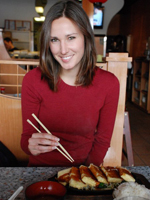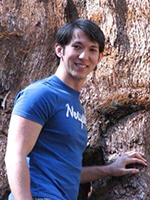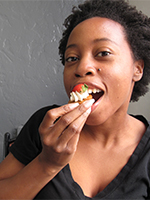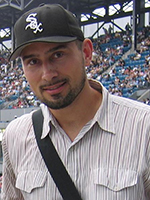
February 14th, 2013 |

Author:
crystalgable
A guest blog by The Veggie People originally published at ThePeopleProject.com on Feb. 5,2013

Although there are plenty of people who will disagree with me, it is important to remember, especially if you are transitioning over to a vegan lifestyle, that there is no one “correct” way to be vegan. Contrary to what the makers of the Hollywood film “Scott Pilgrim vs. The World” would have us think, there is in fact no vegan police, and there is no one all-knowing authority on the subject of “being vegan.” You will not be arrested for eating bread that may contain egg products, and you will not be punished for begrudgingly allowing your in-laws to bring a non-vegan lasagna to your potluck dinner. Although for many of us, veganism represents a lifestyle or a philosophy, it is not a religion, nor does it come with a set of rules or precepts that any one person is required to adhere to.
For some, veganism represents a dietary choice and nothing more. For others, it represents a path to a healthier, more vibrant lifestyle. And for others, it represents a social and political movement against the global environmental degradation that is the direct result of factory farming. For others still, it represents a moral and ethical choice in favor of a kinder, more compassionate vision of the world, which allows us to live in conformity with our own internal values, a vote in favor of animal welfare and in favor of the right of an animal to live without human-imposed fear, torture, mutilation, and suffering. For many of us – and I will venture to say for most of us – veganism represents some combination of the above, any one of which may be of greater importance than the others at any point during our lives.
I have met people who are vegan exclusively for health-related reasons. Often, due to an illness, or to a physical ailment or condition, individuals will turn to a vegan diet in an effort to treat themselves, often with great success. Many such vegans are uncomfortable discussing the idea of animal rights or animal welfare, because for them, their primary motivation for adopting a vegan diet has nothing at all to do with ethics or morality, but represents instead a conscious vote in favor of their own health. I have also met vegans who have chosen a vegan lifestyle almost exclusively for moral or ethical reasons. These individuals repeatedly and courageously demonstrate their commitment to fight for the rights and welfare of factory-farmed animals, relegating “health” to a secondary reason for their choice to adopt a vegan lifestyle.
Just as there are so many different individuals on the face of this planet, there are – naturally – just as many different ways to be vegan. There are some vegans who abstain from eating and consuming all animal products, but who will buy clothing made of wool. Others will abstain from eating and wearing all products that contain animal ingredients, except those that contain bee pollen, beeswax, and honey. Others still will abstain from eating, wearing, and consuming all animal products, with the exception of some products like maple syrup, white sugar, and various wines and beer – which may or may not have been processed with animal products. Others will strictly abstain from eating and consuming all animal products whatsoever, including those that may have come “into contact” with animal products.
Some vegans will eat soy or wheat; some will not. Some will eat processed food or junk food; some will not. Some will eat cooked food; some will not, preferring to eat only raw fruits, vegetables, nuts, seeds, and grains. Some vegans will date non-vegans; some will not. Some vegans will raise their children as omnivores, while other vegans will raise their children on a vegan diet. Some vegans have pets; others have companion animals. Some call themselves vegan; some call themselves vegetarian; still others refuse to call themselves vegan or vegetarian, preferring to say that they have adopted a “plant-based diet.” There are as many faces of “being vegan” as there are vegans in the world, but there is one thing that we share: We all abstain from consuming animal products as much as is possible under the circumstances – the question of how much, when, why or how remaining a matter of individual choice or preference.
Activism within the vegan community is also a question of personal choice. Many vegans are health activists, who by example or as part of a larger social movement, invest their time and energy toward educating others about the health advantages of adopting a vegan diet. Others are environmental activists, who by example or as part of a larger social movement, invest their time and energy toward educating others about the environmental advantages of adopting a vegan diet and lifestyle. Still others are political activists, animal rights activists, human rights activists, or peace activists, who by example or as part of a larger social movement, invest their time and energy toward promoting the vegan diet and lifestyle as a progressive move in favor of a brighter, more promising future for all of the inhabitants of the earth. But just as there are vegans who are activists within this community, there are vegans as well who do not consider themselves activists at all, who choose to adopt a vegan diet or lifestyle for their own quiet reasons, who prefer not to engage in any political discussion about environmental issues or animal welfare, or even about health and nutrition. For them, veganism is a personal dietary choice, and nothing more.
Regardless of the foregoing, given the importance that we place on the mighty dollar (or euro, pound sterling, peso, etc.) in today’s society, there is no question that when you choose to adopt a vegan diet, many people – other than your friends and family – will notice. The meat, dairy, and egg industries will notice. The fish and shellfish industries will notice. The leather, fur, and wool industries will notice. Company executives who realize that they are not getting your business because there are animal ingredients in their products, may decide to substitute these ingredients with plant-based ingredients – not out of any effort to “do good” in the world, but because they want YOU to become their customer. Company executives who realize that they are not getting your business because they are testing their products on animals in laboratories, may suddenly “see the light” and decide that these antiquated and unreliable tests are no longer necessary. In fact, some of these company executives might even decide to roll out a line of cruelty-free vegan products in an effort to win back your loyalty. Whether you mean to or not, whether your decision is a personal one or one that is motivated out of a conscious desire to change the world, there is no question that people will notice that you are no longer consuming animal products.
Trust me. EVERYONE will notice.
I am one who believes in personal, small-scale activism – which I believe to be an extremely potent form of activism. Every time you meet a person and say “I’m vegan,” you are making a powerful, but quiet statement in favor of a particular vision of the world. It may not even be your intention to do so, but at this particular point in time, when even avid meat-eaters are expressing concern about the additives and hormones that are being used to produce the meat on their dinner plate, your statement makes people think twice about a whole range of issues, from animal welfare and factory farm runoffs to mercury-tainted fish and mad cow disease. And so, whether or not it was your intention to do so, you have now set the stage for a discussion – which may or may not take place, depending on how you feel at the moment, how open you are about “being vegan,” and whether you think your dinner companions are open-minded enough to listen to what you have to say.
My objective in writing this article is simply to say – especially to those of you who are currently transitioning to a vegan diet – that there is no one correct way to “be vegan.” So, relax, have fun, get out and try new things. Try vegan junk food or processed food. Try macrobiotic cuisine. Try raw vegan food. Try vegan superfoods. Try an intimate dinner for two at a swanky, gourmet vegan restaurant. Visit an animal sanctuary, or your local shelter. Volunteer at an organization that promotes vegan school lunches. Don’t worry about whether you should give away your leather coats right now. And don’t worry too much about whether there was any dairy in that bread you ate for lunch at the restaurant. After experimenting with the vegan diet and lifestyle, you will eventually make the choices that are right for you. And don’t think twice about what other people have to say about it. Give yourself the time to ease into the lifestyle, and to educate yourself about the things that are of greatest importance to you.
Here’s the great thing about becoming vegan. Whether your choice to adopt a vegan or plant-based lifestyle is motivated out of a concern for your health, the environment, or the animals – or whether you just think vegan food is too delicious to pass up – whether you’re an eco vegan, ethical vegan, glam vegan, celebrity vegan, gourmet vegan, junk food vegan, raw food vegan, power vegan, fitness vegan, or an all-round super-vegan, your choice is one that will get people to sit up, take notice, and start talking. And whether that is your intention or not, there is no question that this is a good thing for the vegan community and for the world at large. The more we talk to one another, the greater the likelihood that others will listen, and the greater the likelihood that we, as a community, will come up with solutions to create a kinder, better, healthier, happier, less violent, more prosperous world for animals and humans alike. And seriously, how bad would that be?
The Veggie People want to bring together a world community of vegans, with the objective of stimulating debate and discussion about a wide range of issues that are central to the creation of a compassionate society. In building such a community, we look not only to vegans, but to vegetarians with whom we share a desire to end animal cruelty around the world, and to omnivores who are interested in adopting a cruelty-free lifestyle or who wish to learn about veganism. Please visit their website.

April 19th, 2011 |

Author:
Amanda
Here is the transcript from the ISSUES WITH JANE VELEZ-MITCHELL episode featuring Dr. Neal Barnard that aired April 15, 2011 for those (like myself) who missed it.
VELEZ-MITCHELL: All right. Up next, a controversy over school lunches erupts. The battle of milk is next — yes, milk. Every parent has to hear this.
(BEGIN VIDEO CLIP)
JOHN SALLEY, FORMER NBA PLAYER: It`s funny, they put vegetarian food in front of them when they were hungry. Some of them booed, some of them ahh-ed But at the end of it, they all was fed well.
(END VIDEO CLIP)
(COMMERCIAL BREAK)
(BEGIN VIDEO CLIP)
ROBIN QUIVERS, HOWARD STERN SHOW: The food industry has done a great job of confusing us as to what food is and what good food is compared to bad food.
(END VIDEO CLIP)
VELEZ-MITCHELL: Tonight, chocolate milk stirs up a controversy around the country. The debate is raging over whether schools should be passing out that sugary beverage to our kids. Some people argue chocolate, strawberry, any flavored milk is not the only way to get calcium and the added sugar in all that flavored milk is out of control, contributing to the childhood obesity epidemic that America is in the throes of right now.
But the National Dairy Council says in the school cafeteria “milk, whether white or flavored, plays a vital role in helping children meet needs for essential nutrients,” end quote. Reports claim about three- quarters of the milk in school cafeterias is flavored, chocolate milk.
Chef and TV star of the ABC show “Jamie Oliver`s Food Revolution”, he was in L.A. to try and take on childhood obesity. Check this out.
(BEGIN VIDEO CLIP)
JAMIE OLIVER, CHEF: What I`m going to do right now is I`m going to pump this bus, this icon of trust full of one week`s added sugar just for flavored milk in the LAUSD. This is 100 percent real. This happens every day. This is only a week`s worth and this is actually classic to the whole of America. Guys, you think we`re done? We are done. We are done now.
(END VIDEO CLIP)
VELEZ-MITCHELL: Yes. That`s going into our kids` bodies, all that sugar. Jamie says 57 tons of sugar in one week pumped into kids, not just in the L.A. school district but this is happening all over the country. And that is just the sugar they are getting from flavored milk alone.
Straight out to the renegade lunch lady, Ann Cooper, glad to see you there in your starched whites. Why are you so upset about schools serving chocolate milk?
ANN COOPER, RENEGADE LUNCH LADY: I mean, we just shouldn`t serve our kids that much sugar. Most chocolate milk has twice as much sugar as the same fat content as regular milk. There`s no reason with this obesity crisis to be force feeding our children sugar.
VELEZ-MITCHELL: I want to bring in Dr. Neal Barnard, the national best-selling author of fantastic book “21-Day Weight Loss Kick Start”. You`re an expert in combating obesity. Now, in your opinion, doctor, is this just about the sugar or the high fructose corn syrup in flavored milk? What about the milk itself? Is the milk itself helping or hurting our children?
DR. NEAL BARNARD, CLINICAL RESEARCHER AND HEALTH ADVOCATE: It`s hurting our kids. And the problems are that kids today are in the worst shape of any generation we`ve ever had. The risk of diabetes, the risk of obesity, the risk of high cholesterol and the heart disease it leads to, they are higher than it has ever been. And a big part of the reason is that schools, sometimes they are forced to — they are feeding junk to kids. It`s as simple as that.
And it`s not just the sugar that`s in the milk. It`s the milk itself, the main nutrient in skim milk, believe it or not, even before you add anything to it, is sugar, lactose sugar. There is fat in it as well. The proteins, a lot of kids don`t react to it. Kids just don`t need it.
VELEZ-MITCHELL: But what about that calcium argument? And the dairy council talks about that. We got a statement from the dairy council that essentially says that the nutrients that are of public health concern, calcium, vitamin D, and potassium are these essential nutrients found in milk.
BARNARD: Sure, there is a certain amount of calcium in milk but asphalt has calcium in it. There is calcium in so many food; that doesn`t mean you should be eating it. Green leafy vegetables have calcium, beans have calcium; you just don`t need calcium from milk. The vehicle for delivering that little bit of calcium has enough fat, enough calories, enough sugar, enough junk to really put kids at risk. There`s no reason for it.
VELEZ-MITCHELL: Well, here`s my take. Ok. I want to do full disclosure to my viewers. I`m a vegan. I do not drink cow`s milk and I have not in at least 15 years.
Now, I want you to meet my great niece, Nicole, she`s 13 1/2 and this young lady has never tasted cow`s milk in her entire life. She is as well a vegan, we have a lot of them in my family. And she`s very tall, very healthy, and doing very well in school. I think she`s living proof that this whole idea that a child, a human child, must have cow`s milk could be a selling tool that we critically need to question.
Now, the National Dairy Council says it`s difficult and expensive to replace the nutrients lost from decreased milk intake in school meals. We just talked about the calcium. But you just heard, Ann Cooper, Dr. Neal Barnard said there`s calcium in plenty of other things that we can get and we`re not suffering from some massive calcium deficiency nationally. So why push it in the milk all the time?
COOPER: Well, I absolutely agree. There is not a calcium crisis in America. There`s an obesity crisis in America. The reason we serve milk in school is because of the National Dairy Council. I mean it`s a lobbying effort.
As a lunch lady, I have to serve milk at every meal. I have to offer it to every kid. You know, and milk can be, I actually think that milk could be part of a healthy diet. But the idea that in schools we would be serving it to kids one, two, sometimes three times a day is –
(CROSSTALK)
VELEZ-MITCHELL: Hang on. We`re on the other side. We`re getting started.
(COMMERCIAL BREAK)
(BEGIN VIDEO CLIP)
SALLEY: It`s funny, they put vegetarian food in front of them when they were hungry. Some of them booed, some of them ahh-ed, but at the end of it, they all was fed well.
(END VIDEO CLIP)
VELEZ-MITCHELL: All right. That`s my vegan buddy, NBA great John Salley, we`re back talking about the childhood obesity epidemic and this whole controversy over flavored milk, some kind of chocolate milk, strawberry milk, milk that they serve in schools that critics are saying hey, it`s contributed to the obesity conversation. And we`re actually expanding the conversation to — what about milk in general?
Dr. Neal, here`s my thought and somebody told me this, I didn`t think this up myself. Cow`s milk was meant for cows. We`re the only species, we human beings that steal the mother`s milk from another species and drink it for ourselves. So what does cow`s milk do in terms of how it works on calves and how does that relate to human being?
BARNARD: Yes, well, I think that`s so important. The purpose of milk, if I can put it that way, is not for dunking cookies in it. The purpose of milk is to make a calf grow and so it contains not just calcium and protein at that but it contains hormones. It contains growth factors and it stimulates the production of more hormones and more growth factors in your body.
And you don`t need that, particularly in adulthood where there`s a lot of evidence that men who are drinking milk two or three times a day have more risk of prostate cancer. That`s because the growth in their body is of cancer cells. Now, that`s pretty frightening.
But if you`re looking at kids, kids are drinking milk. They get no advantage for their bones. Back in 2005 pediatrics, an — article in pediatrics showed that kids who never drank milk have just as healthy bones as kids who do. But what they are getting is a lot of fat, a lot of sugar and a lot of health problems.
VELEZ-MITCHELL: Well, here`s my big issue. We have an obesity plague in this country. Obesity is not just an epidemic anymore, it`s a plague. The amount of overweight children in this country is growing at an alarming rate. “Kids` Health” says one out of every three kids in America is overweight or obese.
So, I have to ask you, Ann Cooper, we`re talking about the sugar and now we`re hearing from Dr. Neal and other people say it, even though oh, it`s against that whole mantra about milk does a body good. I think it`s time to question and not just march in lock step and say why this constant drum beat that everybody has to drink milk when nature didn`t design it for human beings, it was designed for calves.
COOPER: Well, you know what; I don`t want to debate whether we should serve milk in schools or not because the U.S. –
(CROSSTALK)
VELEZ-MITCHELL: Why not? If it`s contributing to kids getting overweight maybe we need start thinking outside the box here.
BARNARD: If you serve chocolate milk it has 150, 200, 220 calories depending on the type. This is a big part of the obesity problem.
COOPER: I absolutely agree with that. I absolutely agree with that. We have to get the flavored milks out of school. If a child chooses flavored milk every day for the 180 days they are in school they will gain 2 1/2 or three pounds just from the added sugar in that chocolate. It`s crazy. We have to stop this.
VELEZ-MITCHELL: A lot of people say well, what`s the alternative? And obviously we all know there`s soy milk and there`s rice milk and there`s almond milk. But let`s also question the idea that we all have to be drinking this milky substance. Where did that come from? That`s a cultural invention.
I can wake up and have a green tea in the morning. I don`t necessarily have to have something with milk in it. I can have a piece of fruit. I don`t necessarily have to have something with a dairy product in it. So a lot of what we`re told we have to do is really cultural conditioning.
Final word in a moment.
(COMMERCIAL BREAK)
VELEZ-MITCHELL: Change one thing about our school system starting with Ann Cooper, renegade lunch lady.
COOPER: The one thing I would change in our schools is getting ready of the processed food and, oh by the way, chocolate milk, soda and (INAUDIBLE) get it out of schools.
VELEZ-MITCHELL: Dr. Neal Barnard.
BARNARD: I would base the meals on the healthy foods, the grains, the beans, the vegetables and the fruits. The meats, the dairy products, that`s part of the problem.
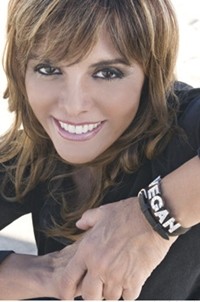 VELEZ-MITCHELL: I agree with you. That`s what I would do if I were in charge of the schools. I would make sure there would be a fruit plate in every single classroom when the kids get the munchies they could reach for a banana or an apple and eat some of this healthy food. You know, some of these kids in the inner-city particularly don`t even know that these vegetables exist because they have choice of fast food or no food at all. Let`s get the healthy food, the greens into the school system.
VELEZ-MITCHELL: I agree with you. That`s what I would do if I were in charge of the schools. I would make sure there would be a fruit plate in every single classroom when the kids get the munchies they could reach for a banana or an apple and eat some of this healthy food. You know, some of these kids in the inner-city particularly don`t even know that these vegetables exist because they have choice of fast food or no food at all. Let`s get the healthy food, the greens into the school system.
This is a wake-up call, America. We need to change.
Thank you, fantastic panel.
Remember folks, Jane is the voice of veganism for cable news. Be sure that you let CNN know that she is appreciated so that they keep her on the air. You can do so by using the comment box at http://www.cnn.com/CNN/Programs/issues.with.jane/.

April 11th, 2011 |

Author:
Amanda
The world lost a bright shining star this past weekend. My words aren’t enough to pay sufficient tribute to Shirley Wilkes-Johnson but she is the reason that I sprinkle pomegranate seeds on birthday cakes and she is the reason that we attended the Lone Star Vegetarian Chili cook-off many times, eventually entering ourselves and taking home the winning trophy in 2006 (for the now defunct Vegetarian Society of Houston). She inspired and delighted multitudes both through Go Vegan Texas (and later Vegan World) Radio and through personal encounters. She was a great thinker and a great cook. She was kind, passionate and driven.
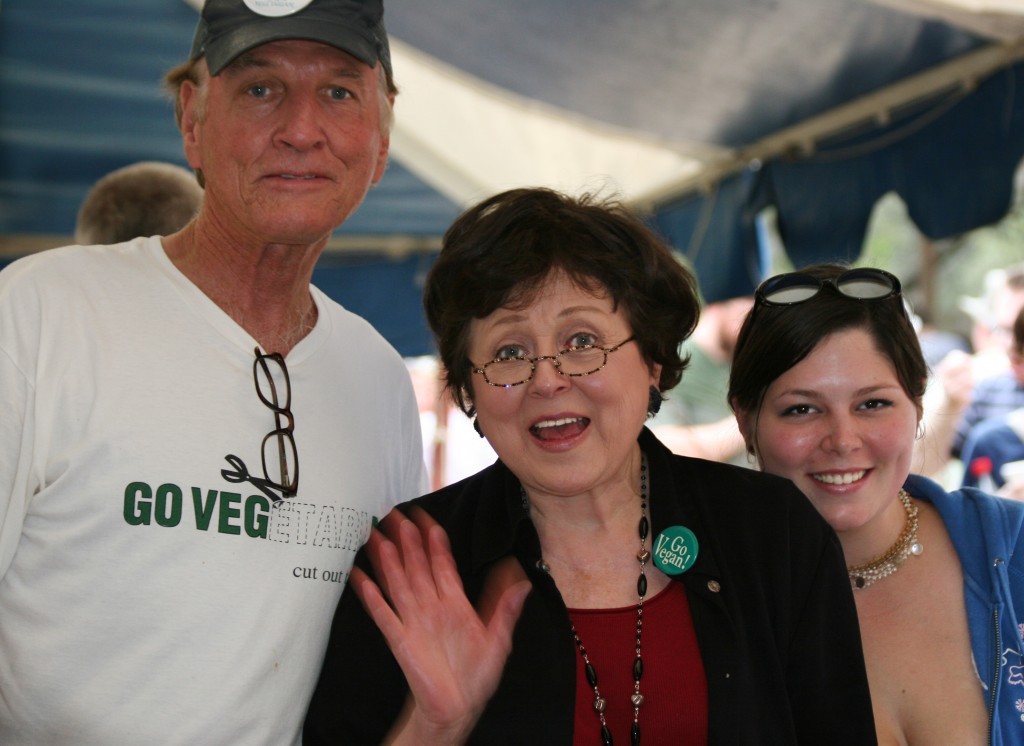
Here is my favorite memory of Shirley…
She taught a cooking class at the Fiesta cooking school in Houston several years ago. This was after 9/11 and the theme was “A Romantic Middle Eastern Dinner”. We were fighting in the Middle East then, as now, and the idea of combining romance and the Middle East might not have made sense to many people, but when she concluded the class it all came together beautifully. She dusted the dessert with pomegranate seeds and talked about how they were considered an aphrodisiac. The pomegranate was a fruit of love, she said, and one of the ways that we learn to love and appreciate other cultures is through their food. Then she did an amazing thing. In the most poetic of ways, she extrapolated that into her dream for world peace, and made each of us there that night believe that we could all be a part of that vision simply by living a compassionate life. She made us believe that love could be spread as readily as hate and that kindness was contagious, and compassion the answer. I never left a cooking class filled with such emotion. Not before then or after. She had a way of turning a simple cooking class into a magical journey into the human heart.
Here are some remembrances of Shirley from others in the last few days…
Vegan.com: http://vegan.com/blog/2011/04/11/in-memory-of-shirley-wilkes-johnson/
Carol J. Adams: http://caroljadams.blogspot.com/2011/04/remembering-shirley-wilkes-johnson.html
Rhea on The “V” word: http://theveeword.blogspot.com/2011/04/in-memory-of-shirley-wilkes-johnson.html
You can be sure that there will be many more to follow.

March 15th, 2011 |

Author:
Amanda
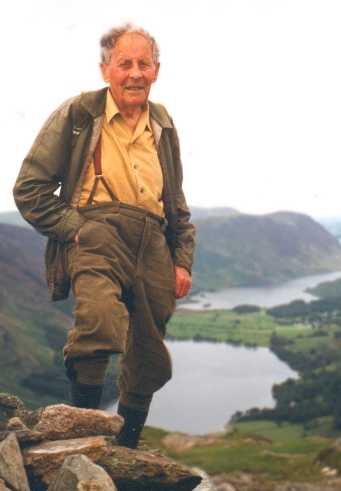 We are “vegans” today because of Donald Watson. He coined the term in 1944 because he felt that the word vegetarian was lacking. According to Watson, “The pronunciation is “VEEGAN” not “VAI-GAN,” “VEGGAN.” or “VEEJAN.” The stress is on the first syllable,” He primarily created the word in reference to dietary practices. It was later expanded to include the use of animals for other reasons. Here is an excerpt from an interview done the year before he died (at the age of 95).
We are “vegans” today because of Donald Watson. He coined the term in 1944 because he felt that the word vegetarian was lacking. According to Watson, “The pronunciation is “VEEGAN” not “VAI-GAN,” “VEGGAN.” or “VEEJAN.” The stress is on the first syllable,” He primarily created the word in reference to dietary practices. It was later expanded to include the use of animals for other reasons. Here is an excerpt from an interview done the year before he died (at the age of 95).
Interviewer: We understand that you are responsible for creating the word “vegan.” How did that occur? Why did you feel the word was needed?
Donald Watson: I invited my early readers to suggest a more concise word to replace “non-dairy vegetarian.” Some bizarre suggestions were made like “dairyban, vitan, benevore, sanivore, beaumangeur”, et cetera. I settled for my own word, “vegan”, containing the first three and last two letters of “vegetarian” — “the beginning and end of vegetarian.” The word was accepted by the Oxford English Dictionary and no one has tried to improve it.
He goes on to say “Veganism gives us all the opportunity to say what we “stand for” in life. The ideal of healthy, humane living is now easy with modern transport bringing us vegan foods from all over the world. Join us and add decades of health to your life, with a clear conscience as a bonus.” You can find the complete interview here.
Watson was very clear throughout his life that health was an important component of his lifestyle. He wanted to outlive his critics, and he refused to put “poisons” into his body, including alcohol. So the genesis of the word vegan had both an ethical and a health component. Animal rights activists that live on processed foods and sodas are outside of Watson’s ideals, as are health food vegans that wear leather. Although, I suspect that this brilliant and compassionate man would have probably embraced both as seekers on the right path. Ideally we should all seek health and justice but the road is never straight. Regarding roads, even car tires aren’t vegan – so we can at most try our very best, but until the world changes, 100% vegan purity is a near impossibility. That’s why we should work towards that change together and avoid disparaging each other as not vegan enough.
The Vegan Voice is intended to promote vegan ideals but we acknowledge that the word means different things to different people. Whether someone is vegan for health, ethics, the environment, or religious reasons we believe that their choice is valid and they have the right to call themselves vegan. We personally try and follow a “nutritarian” style vegan diet. We consider ourselves “plant strong” vegans and eat a “WFPBD”. I find all the qualifiers unwieldy though, so usually we just call ourselves vegans. I don’t buy leather but my husband will, and since the term originally referred to dietary practices I consider him just as vegan as I am. Many people may disagree, but as I see it, the “more vegan than thou” attitude just creates divisiveness in the end. We are stronger if we stand together.
If you’d like to know more, here are some additional Resources:
Watson’s Obituary
Remembering Donald Watson from VegNews Magazine
The very first issue of The Vegan News from November 1944

November 18th, 2010 |

Author:
Amanda
After starting The People Project we realized that many vegans had a lot more to say than what we could fit beneath a photo, so we started a Facebook discussion thread on how being vegan has changed you. We were so moved by the responses that we decided to add a new section to our website with testimonials. Just short personal essays about how veganism has enriched or changed your life. Please let us know if you are interested in contributing to this new feature. In addition to the faces of veganism as seen on The People Project we want to showcase the voices of veganism in your own words.
You might discuss how or why you became vegan. What has changed in your life since doing so, or how you yourself have changed as a result. Revelations and conclusions that occurred on your journey. Opposition or support you’ve encountered. Unexpected rewards along the way. New joys and pleasures. Insights, experiences, or awakenings. We will publish these as they come in, pending approval. As long as there is no inappropriate content (cursing will be turned into @#!* – otherwise almost anything is appropriate) The content will be unchanged other than minor editorial (grammar, spelling) corrections. We welcome a diversity of opinions and views but prefer to keep it positive. We want to inspire and enlighten and inform. We also want to dispel the inaccurate and negative images of vegans that continue to persist in some peoples minds. With your help we can do all of that.
Send your story to veganvoice@gmail.com
If you have a blog, website, email address, Twitter account, Facebook page, etc., that you would like to share we can include a link at the bottom of your testimonial.
Many Thanks. Ed & Amanda


October 20th, 2010 |

Author:
Amanda
Our Vegan Food Photo Contest was a smashing success!
We received over 32 entries but the final decision by our judges was unanimous. The winner was Danica, who co-publishes the blog Soundly Vegan. She received a $100 Amazon gift card as a prize and we will be redesigning our food page using her images. Here is some of her photography, so that you can see for yourself why our judges were so thoroughly impressed.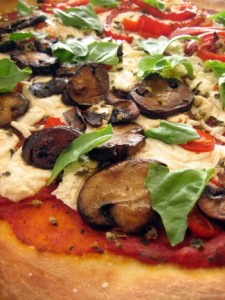
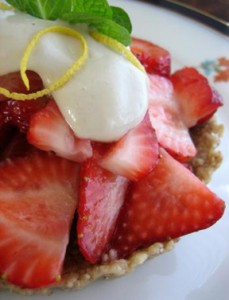
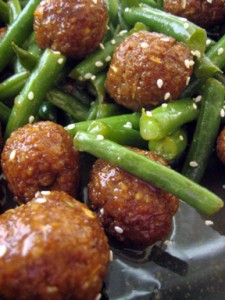
We highly recommend that you visit the Soundly Vegan blog, as it is one of the most beautiful vegan food blogs out there. A sincere thank you from us to all of our contestants for taking the time to enter. We would also like to give special honorable mentions out to Noelle Kelly (An Opera Singer in the Kitchen), Natala Constantine (Vegan Hope), and David Goldstein (My Vegan Gut) for the outstanding artistry of the images that they submitted.

October 9th, 2010 |

Author:
Amanda
Social networks are an outstanding platform for promoting change when used correctly. Veganism is a particularly hot topic online, and it’s no wonder. Mark Zuckerberg, of co-founder Facebook and Biz Stone, co-founder of Twitter, two of the most instrumental figures in the development of the modern cyberscape, are both vegan. 
Facebook is a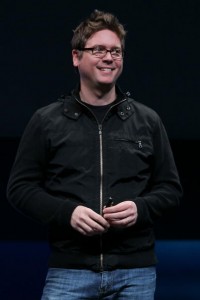 live with vegan causes and campaigns and the Twitterverse is bursting with ways to educate others about veganism. Three Twitter hashtags opportunities immediately come to mind. #TWYE is a Twitter food diary used by dieters and foodies alike to share or track their consumption. #whatveganseat enables vegans to both educate and inspire by tweeting what’s on their plate and #youarewhatyoueat is a fun platform for both sarcasm, and philosophical observations on diet and society. Using these in your food related tweets when apropos is an effective way to get the V word out there and share the delicious diversity of plant based cuisine.
live with vegan causes and campaigns and the Twitterverse is bursting with ways to educate others about veganism. Three Twitter hashtags opportunities immediately come to mind. #TWYE is a Twitter food diary used by dieters and foodies alike to share or track their consumption. #whatveganseat enables vegans to both educate and inspire by tweeting what’s on their plate and #youarewhatyoueat is a fun platform for both sarcasm, and philosophical observations on diet and society. Using these in your food related tweets when apropos is an effective way to get the V word out there and share the delicious diversity of plant based cuisine.
It’s also a good move to post any relevant vegan news stories on FB and Twitter. The more informed we are the better. The most powerful tool we have for promoting veganism is information. Sharing it with others, both vegans and omnis, provides more opportunity for continued dialogue, which is always a good thing.

April 5th, 2010 |

Author:
Amanda
The Holistic Holiday at Sea (Taste of Health Cruise) was a great experience for us once again. This was our second time and we already plan to do it again next year. It is an unmatched opportunity to enjoy memorable vegan cuisine, see informative lectures from world class experts, exercise your mind and body, visit new places, and meet interesting and inspirational people.
One evening at dinner we were sitting with Dr. Neal Barnard of PCRM and Christy Morgan, The Blissful Chef, having a conversation about the various ideas and tactics that the vegan community uses to spread it’s message. There is a level of dissent that can be troubling at times, and Christy in her blissful wisdom likened the players to the spokes of a wheel. They may not all line up perfectly, but they are unified in trying to accomplish the same goal. Moving things forward. Creating progress. We may have different ways of getting there, but we are getting there.
T. Colin Campbell, in one of his lectures, expressed optimism that we may now have reached the tipping point - and I wholeheartedly agree. We are so much further ahead of where we were just a few short years ago. Our message is reaching people, and whether we choose to stress health, compassion, religion, or the environment, the end result is the same. The more we influence others to adopt a plant-based diet, the better off we all are. The synergistic benefits of a vegan diet are potentially world changing. We may be idealist, optimists, cynics, or critics in our approaches, but we can all agree that our goal is a better world, one that may soon be within reach.
Let’s keep that wheel turning and we’ll get there someday.

March 18th, 2010 |

Author:
Amanda
We just watched the documentary film The End of The Line. It was an in depth look at the consequences of over fishing to our oceans and world. It was an excellent film. Definitely worth watching. There was one thing that troubled me about the film and I have seen it time and again. When they talk about what can be done to prevent the devastation that commercial fishing causes, the film advises how to choose fish that have the least problems. Perhaps line caught and non threatened species would be a better choice, it suggests. What it doesn’t suggest is not to eat fish at all. Not one mention of vegetarian or vegan diets as a possible solution. As a matter of fact when it comes to animal agriculture – be it fishing, or factory farming, be it the environmental damage, or the devastating health and economic consequences to our society – the best, most effective, most complete solution is always switching to a vegan diet. Granted at this time most people won’t do that, but why not at least say it, put it out there, give it as an option. Let it sink into the collective consciousness so that someday it is acknowledged as the logical choice that it is by more people.
I’m not singling out this film. We watched The Cove and Food, Inc, and numerous other documentaries in the last few years that all had the chance to offer eliminating animal products as a solution but did not. All were otherwise excellent films. Why won’t they say it? Most likely they don’t know it or practice it. If they do, then they either don’t think people will do it or don’t want to get sued. That means it’s up to us. We need to say something when these issues come up. We need to promote veganism as the solution that it is: the solution to over fishing, factory farming, the health crisis, animal cruelty, environmental destruction. When you see a film like this you also have an opportunity to educate the filmmakers. Write to them and tell them how important their work is and how offering a stronger solution might even make a greater impact. Let them know that you are a vegan and it’s easy. Maybe send them a book along with the letter.
I also just watched an Oprah episode on the diabetes epidemic. I like Oprah. She’s featured several vegan guests in the past and really wants to help people in general. Unfortunately, they featured a recipe for “healthy fried chicken” as an example of improved eating. Most diabetics die of heart disease. Animal foods cooked differently are not the answer for them. So, when I run my errands today I will take Dr. Neal Barnard’s Program for Reversing Diabetes and leave it on the book cart at our local hospital. I don’t have millions of viewers and maybe I won’t solve the health crisis, but if one person who needs the message picks it up, maybe it will make a difference for them. At least I’m putting it out there. It’s up to us to do what we can. Read, write, share. We’ll get the message out.
Just keep trying.

March 8th, 2010 |

Author:
Amanda
Last night’s vegan Oscar party was a success. The four and a half vegans present managed to sufficiently wow the ten omnivores with our food and charm. Hopefully they agree. I know they liked the food at least. It was also exciting seeing two famous vegetarians (Steve Martin and Alec Baldwin) hosting the Academy Awards and vegan Woody Harrelson as a nominee. Maybe I pointed that out a little too fervently every time Woody appeared on screen but I couldn’t help myself.
Parties like this are a great way to get together with friends and promote vegan cuisine in a very positive fun way. No preaching required. Just serve great food and answer any related questions that come up. Someone will always ask. The men talked about health quite a bit and the women discussed issues related to best documentary winner, The Cove, such as the rampant mislabeling of dolphin flesh as fish to fool consumers. Pretty egregious, mislabeling a mammal as a fish – not just a different species but different biological class entirely. Several of us also expressed our enthusiam for Food, Inc., The Cove’s very worthy contender. It was a hard call between the two. I was glad to see one of them win, and happy that they both got some well deserved exposure as a result of their nominations.
Several of our guests were kind enough to contribute to the menu, which consisted of Paula’s delectable hummus, Betsy’s amazing baked tofu – served with peanut sauce, and her mockamole (made with edamame) which is so good I could eat it every single day, Gary brought Quesadilla’s that were a big hit and an apple pie that I was very impressed with. He said the recipe was from The Conscious Cook. What a great book. Every recipe I’ve tried from it has been a winner.
We served back eyed pea and corn salad, spring rolls with spicy cherry sauce, potato skins with salsa, sour cream, and corn relish and a variety of crackers, crudités and other dips. Our son, Benjamin even made his first catering contribution ever. “Benjamin’s Delight” was celery stuffed with vegan cream cheese and olives. Perfect as a passed appetizer, with Benjamin doing the passing. He also helped me roll the truffles (aka Mignardises) in a variety of coatings – raspberry sugar, toasted coconut, and ground walnut with cinnamon. Benjamin later volunteered serving them to the guests, naturally taking a few for himself along the way. Judging by the number of seconds requested they went over well. That recipe will now be a staple. It is found in both The Best of Vegan Cooking and Great Chefs Cook Vegan. So easy, that I will never use another truffle recipe again. I also served the Happy Herbivore’s black bean brownies but we added peanut butter icing for a little extra drama.
At the end of the evening we tallied the ballots and gave out prizes for the most accurate predictions. The winners received AMC, Regal Cinema, and Blockbuster gift cards, as well as copies of The Future of Food.
I can’t resist an opportunity for activism. Even if it comes in a gift bag.











